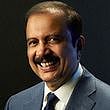UAE: Indian healthcare titan Dr Azad Moopen shares lessons he learnt during COVID-19
Dr. Azad Moopen of Aster says the learnings were both professional and personal

Dubai: Life amid the pandemic in the UAE has come with a lot of learning.
Dr Azad Moopen, founder chairman, managing director, Aster DM Healthcare, said like everyone else, he too has been impacted by the pandemic. “But there has been great learning along the way and that is keeping us active in the business of running a healthcare group,” said Moopen.
When the World Health Organisation (WHO) started talking about rising number of cases of coronavirus at the beginning of the year, he said, “We were pro-active, and preparing ourselves for the worst to come. In early March, WHO announced the situation as a pandemic. But we were equipped to handle the situation well.”
Learning to accept a crisis
Being in the healthcare industry, Moopen said he and his staff had to rise to the occasion and be equipped to the best capacity to handle the situation. “For example when we did our first check of where we stood as a hospital group, we found we had 42 areas of risk. But we plugged all the holes and am so proud to say that we managed to do it as a team.”
Before COVID-19, health care professionals seldom wore a mask while seeing a patient. Now it is different, he noted. “Being equipped to deal with the pandemic also meant foreseeing a situation way ahead. Getting the logistics in order to have everything in place. This was a learning in itself.”
New protocols
He said learning the medical protocols for a pandemic of such a magnitude was challenging, but was made possible with hard work and team support. “Worldwide, not just here in the UAE, people were unaware on how to deal with COVID-19. Now we do, thanks to a whole lot of training and implementation. Aster was able to treat 7,375 patients and screened/tested 100,088 patients for COVID-19 infection.”
“The pandemic also required us to learn something new in the medical field of treating patients in severe respiratory condition - prone ventilation.” Prone ventilation is an invasive mechanical ventilation delivered when the patient is in the supine position. He said Aster deployed over 200 medical staff including doctors, nurses, paramedics who worked round the clock to treat COVID-19 patients in UAE. “Our frontline soldiers were engaged in a war against a monster,” he said.
Detailed planning

Economic lessons
Dr Moopen said, “There is a major impact on our business for sure. The overall revenues in various verticals and geographies have been slashed by more than 60 per cent. As a healthcare provider, our largest cost component is human resources (HR). We are finding ways to have financial sustainability and hope for government support too. “Our frontline doctors, nurses, medical and other staff put their lives at risk. They were in the forefront of it all. And when they fell sick, it broke my heart. My staff are like my family. When something affects them, it affects me too. It felt like an arrow had hit my chest. But I gathered myself and knew I had to stand tall and stay strong. This was a life-changing moment for me at an emotional level. It made me stronger. They saw me gather myself and they knew they had to do the same. We had to face the crisis and give it our best.”
Family ties
He said bonding with the family greatly improved owing to the fact that he is not travelling anymore. “Before COVID-19, I was travelling one week a month. Now that is not happening. It has relieved me a lot. My food habits have improved a lot as well. I just feel more responsible about myself now.”
Going forward, Moopen said the pandemic should not create an emotional or mental barrier among people. “When we talk about social distancing, it should be from a physical point of view. Yes, that is key. But let people not socially distance themselves from loved ones and friends at an emotional level. If anything, the pandemic should bring people closer to each other.”
Sign up for the Daily Briefing
Get the latest news and updates straight to your inbox








